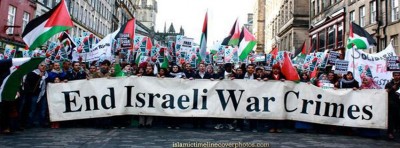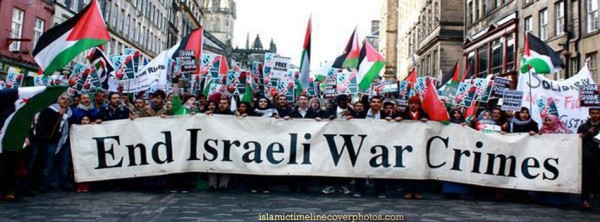 A leading international rights group on Thursday alleged that Israel committed war crimes during this summer’s Gaza war, saying it reached that conclusion after investigating three attacks on or near United Nations-run schools housing displaced Palestinians.
A leading international rights group on Thursday alleged that Israel committed war crimes during this summer’s Gaza war, saying it reached that conclusion after investigating three attacks on or near United Nations-run schools housing displaced Palestinians.
Human Rights Watch said it investigated the strikes at the schools in three separate locations in the war-battered Gaza Strip, attacks in which at least 45 people were killed.
According to its investigation, based on field research and interviews with witnesses, the New York-based group said no military targets were apparent in the area of the schools and that some of the attacks were indiscriminate.
“The Israeli military carried out attacks on or near three well-marked schools where it knew hundreds of people were taking shelter, killing and wounding scores of civilians,” Fred Abrahams, special adviser at Human Rights Watch, said in a statement. “Israel has offered no convincing explanation for these attacks on schools where people had gone for protection and the resulting carnage.”
Israel argues that the heavy civilian death toll during the 50-day summer war was Hamas’ fault, accusing the Islamic militant group of launching rockets — and drawing retaliation — from school yards, residential areas and mosques.
On Wednesday, the Israeli military announced it had launched its own probe into cases involving Palestinian civilian casualties during the war, including the shelling of a UN school.
The announcement was apparently meant to send a signal that Israel can police itself as it faces the spectre of international war crimes probes.
The brutal Gaza war left more than 2,100 Palestinians dead, the majority of them civilians, according to Palestinian and UN officials. Israel says the number of militants killed was much higher and accuses Hamas of using civilians as human shields. On the Israeli side, 66 soldiers and six civilians were killed.
About a quarter of a million Palestinians displaced by the violence were seeking shelter in UN-run schools.
In one instance, in an attack on a school in Beit Hanoun on July 24, Israel said it had fired mortars toward Hamas fighters operating near the school, in response to anti-tank fire directed at them. The military said one mortar landed in the school courtyard, which according to video footage it released claiming to show the strike, was empty. Human Rights Watch said that seven Palestinian witnesses in the territory ruled by the Hamas militants disputed the claim.
On a strike on July 30, the military said it was again responding to Hamas fire from nearby. Human Rights Watch said Israel provided no evidence for the claim. “In any event, the use of high-explosive heavy-artillery shells so near a shelter filled with civilians constitutes an indiscriminate attack,” the group said.
It said another attack in Rafah, in the southern Gaza Strip, was “unlawfully disproportionate.”
The attacks on the schools had elicited widespread condemnation, with UN Secretary-General Ban Ki-moon calling one a “moral outrage and a criminal act.” The UN, which has accused both Israel and Hamas militants of violating the rules of war, has appointed a commission of inquiry to look into the fighting.
Western-backed Palestinian President Mahmoud Abbas is threatening to seek membership in the International Criminal Court in order to press charges against Israel.
The Israeli military said Wednesday it has opened criminal probes into two wartime cases, including the school attack in northern Gaza.
The military has beefed up its legal teams and gathered reams of evidence, including photos and video clips, meant to prove that Hamas used civilian areas for cover when firing rockets and to show that Israel showed restraint in its responses.
Lt. Col. Peter Lerner, a military spokesman, told the Associated Press on Thursday that the military has confidence in a system that works.
“We are doing it so that we can improve and so that if people have carried out things not in line with rules and regulations that they will pay a personal price,” he said. “Every decision our military advocate general makes is under scrutiny from the civilian establishment.”
Also Thursday, a new World Bank report, said that continued “political instability resulting from conflict, military rule, violence, political division, and lack of free movement and access to resources and markets” is the main obstacle to economic growth in Palestinian territories.
Globe and mail


Leave a Reply
You must be logged in to post a comment.